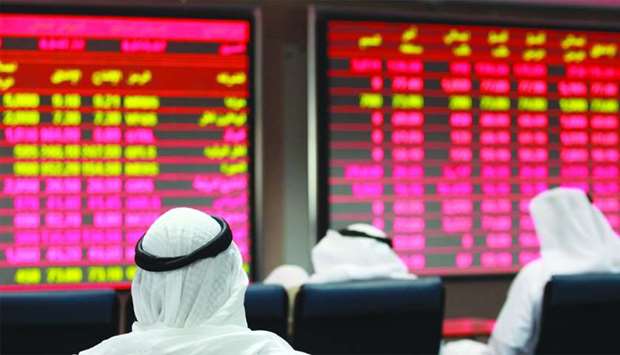The Qatar Stock Exchange on Wednesday reopened after Eid holidays on a weaker note with its key index losing more than 46 points, mainly on foreign institutions’ net profit booking.
The insurance, telecom and industrials counters witnessed higher than average selling pressure as the 20-stock Qatar Index settled 0.49% lower at 9,321.96 points, although it touched a high of 9,389 points intraday.
Islamic stocks were seen declining slower than the other indices in the bourse, whose year-to-date losses were at 10.59%.
Market capitalisation saw about QR2bn, or 0.33%, decline to QR545.88bn, mainly owing to small cap segments.
A total of 19,135 exchange traded funds (both QATR and QETF) valued at QR75,937 changed hands across four transactions; while in the debt market, there was no trading of sovereign bonds and treasury bills.
Trade turnover grew amidst lower volumes in the market, where the banking, industrials and consumer goods sectors together accounted for more than 73% of the total trading volume.
The Total Return Index shed 0.49% to 17,921.16 points, the All Share Index by 0.31% to 2,914.08 points and the Al Rayan Islamic Index (Price) by 0.14% to 2,104.73 points.
The insurance index tanked 1.78%, telecom (1.37%), industrials (0.64%), banks and financial services (0.25%) and consumer goods and services (0.05%); while transport and real estate gained 0.64% and 0.39% respectively.
Major losers included Qatar General Insurance and Reinsurance, Aamal Company, Qatar Electricity and Water, Ooredoo, Qatar German Company for Medical Devices, Qatar Islamic Bank and United Development Company; even as Qatar First Bank, Qatari Investors Group, Baladna, Al Khaliji, Milaha, Dlala, Inma Holding, Medicare Group, Qamco, Barwa and Vodafone Qatar were among the gainers.
Foreign institutions turned net sellers to the tune of QR87.54mn compared with net buyers of QR2.5mn on July 29.
Gulf institutions’ net selling increased perceptibly to QR1.46mn against QR0.13mn the previous trading day.
However, domestic funds’ net buying grew influentially to QR59.79mn compared to QR30.02mn last Wednesday.
Local retail investors were net buyers to the extent of QR17.28mn against net sellers of QR34.19mn on July 29.
Arab individuals’ net buying rose considerably to QR10.38mn compared to QR4.75mn the previous trading day.
Gulf individuals’ net buying strengthened marginally to QR0.81mn against QR0.04mn last Wednesday.
Foreign individuals turned net buyers to the tune of QR0.76mn compared with net sellers of QR3.04mn on July 29.
Arab institutions continued to have no major exposure.
Total trade volumes fell 8% to 202.93mn shares, while value rose 21% to QR503.69mn and transactions by 49% to 13,370.
The consumer goods and services sector’s trade volume tanked 41% 40.33mn equities, value by 36% to QR88.29mn and deals by 15% to 1,928.
The banks and financial services sector saw a 21% plunge in trade volume to 57.61mn stocks but on a 35% jump in value to QR204.15mn and 87% in transactions to 5,419.
However, the transport sector’s trade volume grew about eight-fold to 13.8mn shares and value by more than 10-fold to QR54.65mn on more-than- tripled deals to 813.
The insurance sector’s trade volume more than doubled to 5.73mn equities and value also more than doubled to QR13.03mn on an 85% increase in transactions to 261.
The industrials sector reported a 19% surge in trade volume to 50.74mn stocks, 41% in value to QR84.22mn and 49% in deals to 2,605.
The real estate sector’s trade volume shot up 16% to 26.57mn shares, value by 17% to QR38.24mn and transactions by 60% to 1,442.
There was a less than 1% gain in the telecom sector’s trade volume to 8.15mn equities but on a 12% shrinkage in value to QR21.11mn despite 15% higher deals at 902.


